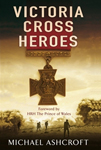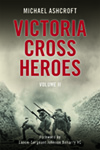A Passion For Bravery
By Lord Ashcroft KCMG PC
My great passion for bravery dates back more than half a century. I was born in 1946, the year after the end of the Second World War and, as a child, discussions about the events of 1939–45 frequently dominated everyday conversation. By the time I was about twelve, I had developed an interest in bravery. I was full of admiration for people who had performed heroic acts in the face of terrifying threats. I looked up to those who were prepared to risk sacrificing the greatest gift of all – life itself – for their country, their comrades and for wider freedoms.
After many earlier attempts, I was finally able to persuade my father, Eric, to talk about his wartime experiences. He told me that he had been among the first young men to enlist in 1939, joining the South Lancashire Regiment. My father described how, in the build-up to the D-Day landings, he and other officers had been briefed to expect 75 per cent casualties – dead and wounded – on the beach as they landed in Normandy. At dawn on 6 June 1944, my father found himself in a small, vulnerable landing craft crashing through the waves in the English Channel. He was bound for Sword Beach as part of the British 3rd Infantry Division’s assault on German-occupied France.
My father and many of his comrades were seeing action for the first time. He portrayed a vivid picture of how the landing craft were filled with the real smell of vomit and the metaphorical smell of fear. As they arrived on the beach, they raced forwards confronted by heavy machine-gun fire. Among the early casualties was the commanding officer, a colonel, who was shot dead at my father’s side. My father, too, was hit by shrapnel, receiving serious injuries to his back and one of his arms. However, he fought on until, wounded and weary, he was ordered from the battlefield to receive medical treatment. Although my father eventually made a full recovery (and lived until he was eighty-three), the injuries he received at Sword Beach were serious enough to end his front-line service.
As a schoolboy, I felt enormous pride that my father had been so courageous in the heat of battle. Some time later, I first heard of something called the Victoria Cross (VC). I knew that it was a bravery award and that it had first been awarded by Queen Victoria, but little else. However, my long fascination with the VC and the heroics of its recipients was born. Eventually, I found history books in the school library that gave me an understanding of exactly what the VC was, and how and why it came into existence.
The more I read about the VC, the more interested I became in it. Even when I was frantically busy pursuing a career as an entrepreneur, I found time to read the occasional book on the VC. Little did I know, of course, that I would one day build up the largest collection of VCs in the world – and even write a book on the subject.
* For a longer account of Lord Ashcroft’s early interest in bravery read his books,
Victoria Cross Heroes, Volume 1 and Victoria Cross Heroes, Volume 2.

